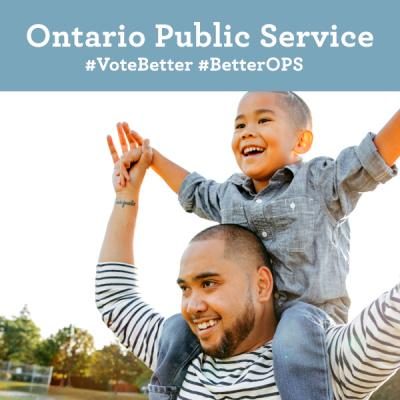Society

Imagine an Ontario without poverty, or homelessness, or needless despair. Where equality is the norm and diversity is celebrated.
It’s an ambitious goal, but not out of reach.
We can afford to invest in the programs and services that show we care: universal public child care, affordable housing, youth mental health and rehabilitation, and community services.
In short, we can afford to care. And as a rising tide floats all boats, we will all benefit.
More than 475,000 Ontario children are living in poverty
Ontario’s need for a sturdy social safety net has never been greater.
Child poverty rates are up, the housing crisis persists, our child care costs are the highest in Canada, and too many people are earning less than they should because of discrimination.
Yet community services in Ontario have consistently been underfunded. More cuts and privatization will only make a bad situation worse.
Failing to invest in our communities will cost us all – it will mean more poverty, more inequality, and more children, youth, and adults who are less healthy, less well educated, and less likely to contribute productively to our communities.
A better Ontario means #BetterSociety. Let’s #VoteBetter
Platform Priorities:
Increase base funding to agencies providing community services.
Create a universal, publicly run, not-for-profit child care system.
End the use of privatization, for-profit providers, and competitive bidding – all of which reduce care quality and, in many cases, increase long-term costs.
Meaningfully address the affordable housing crisis.
Ensure true pay equity for all Ontario workers
LCBO
Ontario is better with a strong LCBO.
Its profits help pay for teachers, highways, seniors’ care, and more. And its professional, highly trained employees ensure that alcohol is sold safely and responsibly.
Alcohol isn’t just another consumer product – it’s a controlled substance. Most drink responsibly, but a minority don’t. Thousands of Ontarians experience harm from someone else’s drinking.
We must keep alcohol out of the hands of minors and intoxicated adults. LCBO retail staff do that. They refuse to sell to people who appear intoxicated, and they check customers’ ID if they appear younger than 25. Last year, they prevented sales to 250,000 people.
Safety. Prosperity.
$2.06 billion: the amount of profit our public services received in 2016-17 from the publicly-owned and managed LCBO.
Letting private corporations sell alcohol hurts Ontarians.
It means we give up profits, which will lead to tax hikes and public service cuts.
And it means putting children and people struggling with dependency at risk.
How can grocery corporations be considered responsible retailers when they fixed the price of bread for years?
Convenience store sales is another dangerous idea.
With so many potential risks, the government must not allow any more grocery stores to begin selling alcohol. The government must also study the health, social, and economic impacts of privatization to date and, if necessary, reduce or eliminate the sale of alcohol in grocery stores.
That’s why a #BetterLCBO means a better Ontario. Let’s #VoteBetter
Platform Priorities:
Keep the LCBO publicly owned and operated.
Stop the expansion of alcohol sales in grocery stores.
Keep all alcoholic beverages out of convenience stores.
Children’s Aid Societies
Child protection agencies provide children with a chance at success even when they are faced with adversity. Child protection workers are most effective when they can provide prevention programs to families and can spend more time with children and families at risk.
The new Child Youth and Family Services Act seeks to strengthen child and youth services. This is a good, start, but we must go farther.
Child protection workers now spend up to 3-5 times longer to complete administrative tasks using the CPIN database.
Children’s Aid Societies struggle to balance budgets within the current funding formula. The new information technology system, the Child Protection Information Network (CPIN), has placed many agencies in deficit positions and is contributing to an unsustainable administrative workload burden on workers.
Workers can’t do it alone. A strong social safety net is more important than ever at a time where there is an overrepresentation of poor, racialized, and Indigenous children involved with the system.
Platform priorities
Improve funding to agencies to cover the cost of new technologies (CPIN), increase prevention work, and hire more front-line workers.
Establish a provincial requirement ensuring workers conduct home visits in pairs.
To improve standards of care for vulnerable children and youth, eliminate low-cost, low-quality, for-profit providers.
Child Treatment
The need for children’s mental health services has never been so great.
Children and youth can wait up to 18 months for mental health services in Ontario. In some case they have to travel great distances to access residential beds.
Since 2006, there has been a 63 per cent increase in emergency department visits and a 67 per cent increase in hospitalizations for Ontario children and youth with mental health issues.
Community–based mental health services are a first line of defense for youth seeking help. Services must be accessible, consistent and timely to prevent more serious issues from emerging. It is critical that funding support community, not-for-profit services on a grand scale to remedy years of neglect.
More than 12,000 children and youth in Ontario are currently waiting to access mental health services.
Community children’s mental health agencies have not had a base funding increase for 12 years. The system is at breaking point. We need more children’s mental health workers providing direct treatment in the system.
Platform priorities
Fund the real cost of providing community-based mental health services to children and youth in every community in Ontario.
Increase the number of mental health beds for children and youth in every community.
Provide block funding to operate residential services instead of diverting public dollars to expand the for-profit system.
Developmental Services
Ontario needs a comprehensive plan for people with developmental disabilities.
To create supportive housing infrastructure, quality day programs and supported employment opportunities that offer individuals a dignified quality of life, the current system needs massive investment and a complete overhaul.
A well-compensated, trained and dedicated workforce is a key ingredient to building a better system. Unfortunately, community-based agencies have created a low wage work environment with many part-time workers holding multiple jobs to get by.
It doesn’t have to be this way.
Developmental services work could become a career of choice if the government sets provincial labour standards to dramatically improve, retention, training and service delivery. The government must also ensure that equal pay for equal work provisions under Bill 148, the Fair Workplaces, Better Jobs Act,are enforced.
75 per cent of the developmental services workforce works part-time across 67 agencies represented by OPSEU.
Last year a $110-million class action lawsuit was launched against the Ontario government for failing to eliminate the years-long wait list for support services for adults with developmental disabilities.
Individuals with developmental disabilities continue to be placed in psychiatric wards, long-term care homes or for-profit group homes living in deplorable conditions. There is no excuse for housing people under these conditions. A patchwork approach will not address the crisis.
The government approach to provide funding directly to families to have them solve their own challenges resulting from a lack of supports in the system is not the answer. Direct funding (Passport program) will only grow an informal, unregulated workforce and limit the ability for publicly-funded agencies to expand much-needed services.
Platform priorities
Set central labour standards to strengthen the workforce and improve stability, training and retention of qualified workers in the field.
Increase the number of full-time jobs in the sector.
Increase base funding to agencies to expand housing and program services.
BPS Corrections (Youth Justice)
Right now, there are two systems providing closed-custody facilities for youth charged or convicted with crimes. One system is made up of facilities operated directly by the Ministry of Children and Youth Services (MCYS). The other system is made up of facilities operated by arms-length, private “transfer payment agencies.”
In 2016, an independent consultant recommended that these two systems be merged into a single system because it will improve and standardize training, hiring, fair wages, and health and safety.
Many of the employees in the youth justice sector aren’t covered by WSIB
The health and safety of workers who provide services in secure and open custody is a constant source of concern.Employers in transfer payment agencies are exempt from providing WSIB workplace insurance coverage and often offer minimum coverage funded entirely by employees. Legislation can be changed to ensure that all workers in youth justice have access to health and safety protections and benefits.
Platform priorities
Create an integrated system for youth justice directly operated by the government. A single system would ensure that youth receive care from a stable, qualified, dedicated workforce that has access to professional wages and health and safety protections.
Reintroduce Bill 145,WSIB Coverage for Workers in Residential Care Facilities and Group Homes Act.
Invest in creating more transitional homes, and rehabilitation programs to support youth in conflict with the law.
Community Agencies
Community agencies are vital to healthy communities and play a significant role in hiring from and serving diverse communities. A wide range of services are directed to the most marginalized individuals through shelters, community legal clinics, and employment supports, and a patchwork of child care services are funded by the province and municipalities.
Community agencies in the non-profit sector deliver grassroots services that often rely on diverse tiers of funding sources to run programs.
The Ontario Non-Profit Network (ONN) has identified the lack of decent employment as a key sector issue and is calling on all levels of government and employers to address low levels of pension plan and benefits coverage; high rates of part-time and contract employment; underinvestment in training and development; and poor work-life balance.
Ontario’s non-profit sector employs over one million workers.
Non-profit organizations contribute to precarious work by emphasizing part-time, contract work and not investing in benefits to grow the workforce. These conditions are often at odds with progressive mission statements directed to the populations served by local community agencies.
Stable funding and greater coordination amongst provincial and municipal governments would go a long way to ensure that community agencies realize their mandates to deliver accessible, equitable and culturally appropriate services to vulnerable populations and provide decent work to its diverse workforce.
Platform priorities
Provide consistent municipal and provincial funding to support decent work in the sector.
Create a universal, publicly run, not-for-profit child care system.
Stabilize funding for community legal aid clinics.







